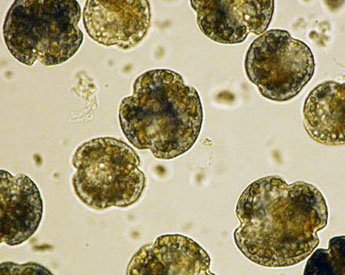|

Karenia mikimoto microalgae. (Photo: Sernapesca)
Sernapesca evaluates declaring state of plague emergency due to toxic microalgae
 CHILE
CHILE
Friday, February 10, 2017, 21:30 (GMT + 9)
The National Fisheries and Aquaculture Service (SERNAPESCA) evaluates the possibility of declaring a state of plague emergency due to the blooming of toxic algae in the waters of southern Chile, in order to prevent its dispersion towards the North.
Sernapesca reported this week that salmon farms Australis and Nova Austral informed the death of more than 170,000 fish over the last few days, possibly affected by the emergence of microalga Karenia mikimoto.
Nova Austral confirmed that about 149,000 smolts to be stocked died while being transported to a Magellan farming centre, near the Gulf of Penas, presumably because of a toxic alga.
For its part, Australis reported the loss of about 20,000 salmon that were transported for harvest from the Aysen region.
The total biomass of salmon lost so far reaches 124 tonnes, a smaller percentage when compared to the 650,000 tonnes of production estimated by the industry for the year 2016.
The general manager of the Technological Institute of Salmon (Intesal), Alfredo Tello, explained that summer is a risky period and everyone should be on alert, but tried to bring some peace of mind.
"The objective is to properly prevent with reliable information and not to alarm groundlessly, since that can bring worse consequences," he said, according to El Mercurio.
Meanwhile, the director of Sernapesca, Jose Miguel Burgos, said that the area where the phenomenon is most pronounced is located south of Aysen Region, almost reaching the border with Magallanes. However, he acknowledged that the presence of a second group of algae - presumably the Thalassiosira pseudonana - was also detected in the Aysen fjord sector, a situation that keeps the relevant authorities alert.
In the summer of last year, the Chilean salmon industry was shaken by a large bloom of toxic algae in the Reloncavi Sound, where there is a high number of active concessions, which caused millions of losses to the sector.
Related articles:
- Several tuna stocks fall short of MSC's sustainability standards, according to ISSF
- Sernapesca investigates microalgae linked to salmon mortalities
[email protected]
www.seafood.media
|



